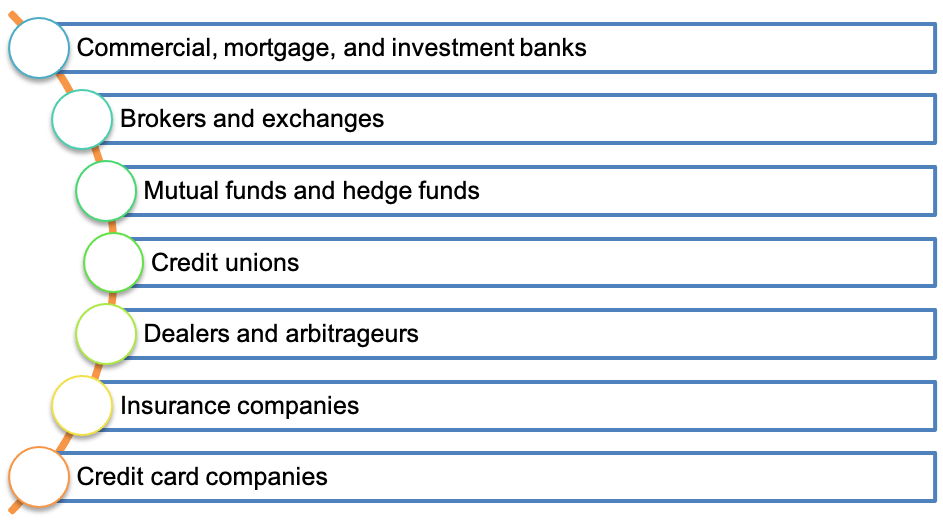Financial Intermediaries
The financial intermediaries facilitate the exchange of assets, capital, and risk between buyers and sellers. The various types of financial intermediaries are:

Some of these intermediaries are described below:
Depositary institutions
These include commercial banks, saving and loan banks, and credit unions. Depository institutions: 1) Raise funds from depositors and other investors and lend it to borrowers. 2) Give their depositors interest and transaction services, such as check writing and check cashing, in exchange for using their money, and 3) Raise additional funds by selling bonds or equity.
Investment Banks
An investment bank is a special type of financial institution that works primarily in higher finance by helping company access the capital markets, such as stock market and bond market, to raise money for expansion or other needs. They also provide advice to firms, notably about mergers and acquisitions.
Brokers, Exchanges and Alternative Trading Systems (ATS)
Brokers help their clients buy and sell securities by finding counterparties to trades in a cost efficient manner. They may work for large brokerage firms, for banks, or at exchanges.
A stock exchange is a place where stockbrokers and trades trade stocks and other securities. A stock exchange can also act like a broker by providing electronic order matching.
Examples of exchange are NYSE-Euronext, Eurex, Deutsche Bourse, Chicago Mercantile Exchange, Tokyo Stock Exchange and Singapore Exchange.
Alternative Trading Systems, also called electronic communication networks (ECNs) or multi-lateral trading facilities (MTFs), offer services similar to exchanges. Some ATS also offer innovative systems that suggest trades to clients. These systems do not exercise regulatory authority except with respect to trading. There are also ATS called dark pools that do not display current client orders. Examples of ATS are: PureTrading (Canada) the Order Machine (Netherlands), Chi-X Europe, BATS (U.S.), POSIT (U.S.), Liquidner (U.S.), Baxter-FX (Ireland) and Turquoise (Europe).
Insurance Companies
Insurers are financial intermediaries because they connect the buyers of their insurance contracts with those parties who are willing to bear the insured risks.
Loss rates for well-diversified portfolios of insurance contracts are much more predictable than for single contracts. Insurance premiums primarily reflect the expected loss rate in the portfolio plus the costs of running and financing the company.
